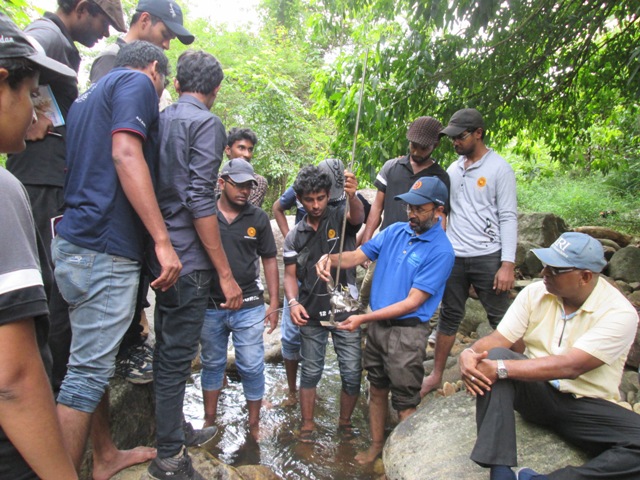Hunuwela Estate project site becomes a field laboratory for university students
Dilmah Conservation, the sustainability arm of Dilmah Tea partnered with IUCN Sri Lanka on "Enhancing the watersheds of Hunuwela Estate through sustaining the habitat needs” at the Hunuwela Estate of the Kahawatta Plantations PLC. On 6 December 2016, IUCN conducted an awareness-raising programme and a field session for a group of 16 University students specialising in Agriculture Engineering attached to the Faculty of Agriculture, University of Peradeniya.

Prof. M.I.M. Mowjood demonstrating stream flow measurement to the students
Photo: Kumudu Herath, IUCN Sri Lanka
The students had a hands-on opportunity to learn the linkages between hydrology and biodiversity conservation towards sustainable ecosystem management. The students and three lecturers engaged in the measurement of physical, chemical and biological parameters and discussed in detail how the project approach brings together scientific knowledge, practical implementation of management plans, stakeholder participation and raising awareness.
The field session was led by Prof. M.I.M. Mowjood of Faculty of Agriculture, University of Peradeniya, with the assistance of Prof. Ranjith Permalal de Silva and Dr. Dammika Dayawansa. In addition to the practical session on hydrology, the students gained a broad understanding of how scientific data can be integrated into decision making related to conservation and management of natural resources.
Hunuwela Estate is the home to a total of 282 species of flora and 214 species of fauna and is an important repository of Sri Lanka’s biodiversity. A significant discovery of the initial biodiversity surveys in Hunuwela Estate carried out by IUCN Sri Lanka in 2012 was the presence of two highly endangered (both nationally and globally) species of dragonflies – the Rivulet Tiger (Gomphidia pearsoni) and Wijaya’s Scissortail (Microgomphus wijaya) – along with another 58 endemic and 28 nationally or globally endangered species residing within the estate.
In 2015, IUCN Sri Lanka launched the ongoing project with the intension of conserving the biodiversity, with special focus on the two dragonflies. Generating and sharing knowledge is one of the key objectives of the project. Designating selected streams and stream habitats as "field laboratories" for research purposes was one of the recommendations IUCN put forward in the Management Plan developed by the project for natural and semi natural areas of Hunuwela Estate.
IUCN and Dilmah conservation are keen on upscaling the implementing of these approaches and recommendations with the participation of the National Universities and educational institutions including local schools
